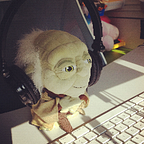Fighting Burnout
I’ve been working in software for quite a while now. The last 5 years I’ve started to become more aware of some changes in my work habits and productivity cycles.
We all have not just on days and off days but strings of on days and strings of off days.
Studying computer science in college, I felt like I was always surrounded by people that were smarter than me, that could learn faster than me and in some cases, I would say they are gifted. I thought it didn’t matter how hard I worked, they would always outpace me. They built on their experiences and you could see that they were able to draw on what they experienced before and use it to surge ahead at blinding speed, at least compared to me.
Did I get you? What I said there was 100% true and if you’re like most people you probably started to mentally go down that rabbit hole with me. I even noticed as I was writing it that my typing started to slow, and I was starting to feel depressed or even sad as I was remembering my mindset during that time.
1. Self-awareness
This self-awareness is an extremely useful tool to develop over time. One of the keys to shortening your “off days” is self-awareness. You need to know when to take action to steer yourself out of these hard times.
Sometimes it’s hard to tell, and other times it’s obvious but by paying attention, you’ll be able to see it sooner and sooner.
You might get stuck on a problem for a while and start thinking less about solving the problem and more about how much of a problem the problem really is!
You might find that one day, nothing interests you in the news and you can’t focus on news or on your tasks at hand. You’re stuck in what feels like a state of limbo. Then the next day you’re upset about how yesterday feels like it was wasted.
Identifying these precursors will help you get things back rolling again. These are like your early warning system for burnout.
2. Identify solutions
We’re all different and there is no “one size fits all” for getting yourself unstuck. There are a lot of articles and blog posts that may give “3 ways to defeat burnout” or “10 steps to recover from burnout” but ultimately you’ll have to use trial and error.
Keep a journal and track each day, if you’re burnt out or if you feel like things are turning around. You can also use this to track what methods you’ve used to try and shorten your off days. Analyzing the data later(if that’s even needed) you’ll be able to see what methods work best.
For myself I’ve found that I need a balance of behavior to keep level out my ups and downs. I’ve noticed that the biggest thing I need is regular exercise. I also found that occasionally I need to meditate and try to seek out or remember what got me excited about my career in the first place. It always really helps to seek out and be around people that are really excited and energetic about the things that I’m burnt out on. Writing is something that has helped me reduce the number of burnout stretches and also shorten how long the burnout lasts. Anyway, that’s just me.
3. Taking Action
Sometimes taking action is really hard to do. I’ve found that becoming more self-aware helps me take more action. If you can identify when burnout is approaching, it’s easier to take action than when you’re at the top of the bell curve.
This isn’t something that you’ll always hit the bullseye on, but practice makes perfect right? If you notice a drop in your ability to focus one day, then it might be time to start journaling and keeping an eye out for trouble. Taking the time to make a journal entry might just remind you to go spend some time in the gym or go for a jog.
Conclusion
Just like the people that I was surrounded with in school, change is incremental and every little bit compounds over time. While I was feeling sorry for myself(usually when I checked my grades), I was wasting time while they were probably using that same exact moment to pour over textbooks, getting ready for the next class/exam/quiz and compounding their knowledge.
Saving a few hours every month from burnout will compound over the years and help you get places you never imagined.
Let’s recap!
- Build self-awareness of the precursors to your burnout.
- Identify solutions by journaling your burnout times.
- Use your new information to take action and change the future!
